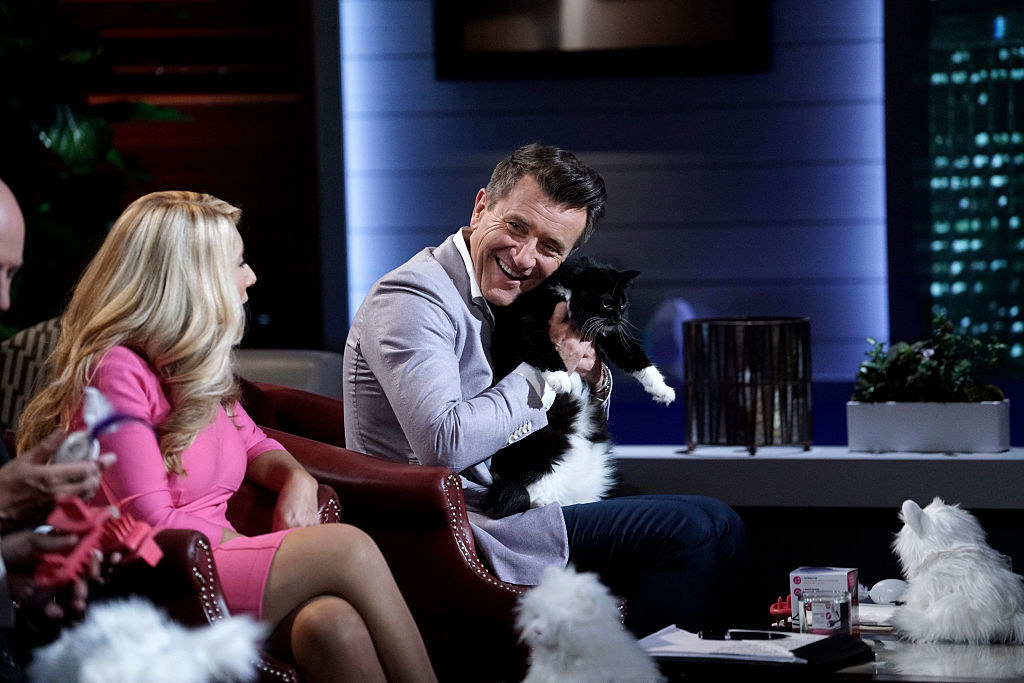1. Every entrepreneur on Shark Tank is required to sit down with a psychologist immediately after filming their pitch.
"They have to make sure we haven't scarred them for life," Mark Cuban once explained in an interview with AOL.

2. Entrepreneurs are strictly banned from reaching out to the Sharks before coming onto the show. You can't have any contact until cameras are rolling.
"There’s a ton of diligence and companies are prohibited from having any prior contact with the Sharks or their teams," former contestant Dave Vasen wrote in an article about his experience on the show. "When you walk down that hallway, the Sharks are learning about you and your business for the very first time."
3. When contestants first walk onto the set, producers make them do a lengthy "stare-down" with the Sharks, where they stare at each other in total silence for a full minute. It can be very intimidating.
A reporter for D Magazine once visited the set and described the stare-down as "excruciating to watch."

4. If a contestant gets a deal on the show, they have to meet with the Shark's business team before leaving the set. That team will do a thorough investigation of the company before making the deal official.
"There's no extreme vetting for the deals before they come on the show," Cuban explained. He added that occasionally, this vetting process gets stressful. "The people behind us that have to do the work when we agree to a deal go nuts sometimes."
5. Obviously, the entrepreneurs aren't allowed to lie about their businesses while pitching...but many of them do anyway.
"The entrepreneur always talks about their sales, which we take on face value, but in the due diligence process, we find out that those sales numbers are really unconfirmed POs [purchase orders] that haven't come to fruition. That's a deal killer," Barbara Corcoran once revealed in an interview with Inc. "Sometimes, legal issues get in the way — the patent the entrepreneur claims to own is actually owned by his ex-brother-in-law. That's a problem."
6. Both the entrepreneurs and the Sharks are allowed to back out of the deal after filming wraps — but it's usually the entrepreneurs who pull the plug.
“Of the deals I make on the air, maybe 30% don’t happen,” Cuban told D Magazine. “I’d say 90 percent of the time, the entrepreneur changed the deal. It was not us backing out.”
7. In the early days of Shark Tank, entrepreneurs were required to sign over a percentage of their business to the production company in exchange for appearing on the show. They got rid of this rule after Mark Cuban threatened to quit over it.
"FYI, there is no additional equity or percentage of anything taken [from the contestants] any longer. That was removed retroactively," Cuban wrote on Facebook at the time. "I told them I wouldn't come back this season if it wasn't."
8. But contestants are required to sign a "no-shop" agreement prior to filming. This prohibits them from making a deal with a Shark, and then using that deal (and the TV exposure) to find a better offer elsewhere.
"We're all asking for the entrepreneur(s) to sign something so they won't shop the deal because that happens all the time," Barbara Corcoran explained. "We [would] make a deal, they shop around and get a better deal and leave us hanging."
9. Contestants are required to write their pitches entirely on their own. Producers then review their script and will occasionally suggest tweaks to make it more engaging for TV.
"We make suggestions, because we want it to be entertaining," executive producer Clay Newbill said in an interview with USA Today. "But these are their companies; they are the boss and have final say on what to do with their pitch."

10. Entrepreneurs only get one take to do their pitch on camera. There are no reshoots if you screw up.
"If you go out there and forget something, there’s no do-overs," Newbill said. "We don’t stop rolling until a few minutes after you’ve exited the set. The only time we’ll stop is if somebody’s mic goes out or a light goes out, but that happens once or twice [per season]."
11. Entrepreneurs are given the basics they'll need for their pitch (like tables and a TV to play video on), but everything else must be provided themselves. In rare cases, producers have had to intervene when a contestant tried to wow the Sharks with something dangerous.
According to USA Today, the show has said no to props like food trucks, a tank filled with thousands of gallons of water, and an actual, living elephant.

12. Each contestant's pitch session lasts much longer than what you see on TV. The average pitch takes about 45 minutes, though they routinely go up to two hours.
Mark Cuban says the longest pitch in Shark Tank history was for the Plate Topper. A whopping two and a half hours of negotiating happened before the Sharks finally struck a deal.
13. Contestants can apply to be on the show, but producers also do a good amount of digging on their own. They specifically seek out entrepreneurs with unique products or backstories and encourage them to apply.
According to Business Insider, producers will comb through crowdfunding sites like Kickstarter and attend industry trade shows in search of the most interesting entrepreneurs to feature.

14. And even after they're selected to be on the show, contestants are warned that their segment might not make it to TV. In fact, just over half of the pitches filmed will actually air.
According to USA Today, Shark Tank filmed 158 segments for a recent season, but only 88 made the final cut.
15. Contestants have to be ready to spill their guts on camera. If they have an emotional backstory, a producer will urge them to tell it during their pitch.
The Sharks even wear earpieces while filming, so producers can feed them questions that will spark an emotional response.
16. However, some of the Sharks hate these sob stories because they think it distracts from the actual pitch. So contestants have to walk a fine line between giving the producers what they need for compelling TV, while still giving the Sharks the concrete facts about their business.
"I hate the backstory, because it's usually a way to hide the realities of the business," Cuban once admitted to ABC News. "The more you try to create stuff to kind of, you know, divert my attention, the worse it is."
17. Child entrepreneurs are occasionally invited to pitch their businesses on the show, but producers warn them that the Sharks won't pull any punches just because they're young.
"We don’t handle them any differently than we do (adult) entrepreneurs," Newbill said.

18. After leaving the Shark Tank set, entrepreneurs are sworn to secrecy about whether or not they got a deal. Any leaks could result in your segment being scrapped from the show.
"You have to sit on it for a long time," Vesen wrote. "If any details are leaked, the production team can just cut you from the show (and will). Even the night we watched, we couldn’t say a word about the outcome. I actually loved that."
And finally...
19. Entrepreneurs are discouraged from participating in the show unless they actually want a deal — but many disregard this and come just for the free TV exposure. The Sharks hate these contestants and refer to them as "gold diggers."
And if they suspect you're a gold digger, they'll call you out on national TV.

